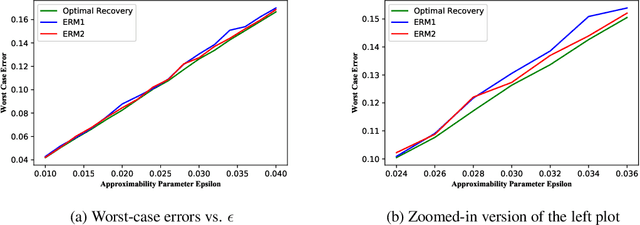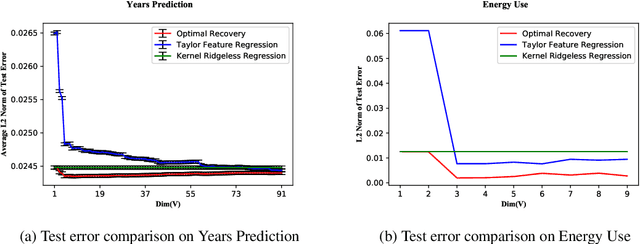Simon Foucart
On the Optimal Recovery of Graph Signals
Apr 02, 2023



Abstract:Learning a smooth graph signal from partially observed data is a well-studied task in graph-based machine learning. We consider this task from the perspective of optimal recovery, a mathematical framework for learning a function from observational data that adopts a worst-case perspective tied to model assumptions on the function to be learned. Earlier work in the optimal recovery literature has shown that minimizing a regularized objective produces optimal solutions for a general class of problems, but did not fully identify the regularization parameter. Our main contribution provides a way to compute regularization parameters that are optimal or near-optimal (depending on the setting), specifically for graph signal processing problems. Our results offer a new interpretation for classical optimization techniques in graph-based learning and also come with new insights for hyperparameter selection. We illustrate the potential of our methods in numerical experiments on several semi-synthetic graph signal processing datasets.
Optimal Recovery from Inaccurate Data in Hilbert Spaces: Regularize, but what of the Parameter?
Nov 04, 2021Abstract:In Optimal Recovery, the task of learning a function from observational data is tackled deterministically by adopting a worst-case perspective tied to an explicit model assumption made on the functions to be learned. Working in the framework of Hilbert spaces, this article considers a model assumption based on approximability. It also incorporates observational inaccuracies modeled via additive errors bounded in $\ell_2$. Earlier works have demonstrated that regularization provide algorithms that are optimal in this situation, but did not fully identify the desired hyperparameter. This article fills the gap in both a local scenario and a global scenario. In the local scenario, which amounts to the determination of Chebyshev centers, the semidefinite recipe of Beck and Eldar (legitimately valid in the complex setting only) is complemented by a more direct approach, with the proviso that the observational functionals have orthonormal representers. In the said approach, the desired parameter is the solution to an equation that can be resolved via standard methods. In the global scenario, where linear algorithms rule, the parameter elusive in the works of Micchelli et al. is found as the byproduct of a semidefinite program. Additionally and quite surprisingly, in case of observational functionals with orthonormal representers, it is established that any regularization parameter is optimal.
Learning from Non-IID Data in Hilbert Spaces: An Optimal Recovery Perspective
Jun 05, 2020

Abstract:The notion of generalization in classical Statistical Learning is often attached to the postulate that data points are independent and identically distributed (IID) random variables. While relevant in many applications, this postulate may not hold in general, encouraging the development of learning frameworks that are robust to non-IID data. In this work, we consider the regression problem from an Optimal Recovery perspective. Relying on a model assumption comparable to choosing a hypothesis class, a learner aims at minimizing the worst-case (prediction) error, without recourse to IID assumption on data. We first develop a semidefinite program for calculating the worst-case error of any recovery map in finite-dimensional Hilbert spaces. Then, for any Hilbert space, we show that Optimal Recovery provides a formula which is user-friendly from an algorithmic point-of-view, as long as the hypothesis class is linear. Interestingly, this formula coincides with kernel ridgeless regression in some cases, proving that minimizing the average error and worst-case error can yield the same solution. We provide numerical experiments in support of our theoretical findings.
 Add to Chrome
Add to Chrome Add to Firefox
Add to Firefox Add to Edge
Add to Edge